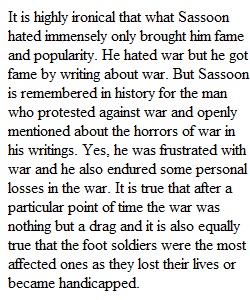


Q The war as seen on the “home front” and on the battlefront was quite different. How did Sassoon attempt to complicate the understanding of the war on the homefront? To what extent had the Great War’s causalities led Sassoon to assign blame for the tremendous loss of life? Who does he blame for the loss of life? To whom does he attribute responsibility? Does he attack or questions specific people and institutions that he sees as guilty for the war? Do you believe that Sassoon was shell shocked? What would your reaction be to reading this statement in the newspaper? The war continued for another year. Did Sassoon’s statement make a difference? Does it matter even if it didn’t? Was Sassoon’s statement righteous or simply wrong?
View Related Questions